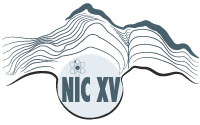
Committees
International Advisory Committee
- A. Aprahamian (University of Notre Dame, USA)
- C. Brofferio (University of Milano Bicocca & INFN, Italy)
- M. Busso (University of Perugia & INFN, Italy)
- S. Degl’Innocenti (University of Pisa & INFN, Italy)
- R. Diehl (MPE – MPG, Germany)
- A. L. Frebel (Massachusetts Institute of Technology, USA)
- Z. Fülöp (MTA-ATOMKI, Hungary)
- L. Gialanella (University of Campania & INFN, Italy)
- A. Guglielmetti (University of Milano & INFN, Italy)
- J. José (Universitat Politècnica de Catalunya, Spain)
- M. Junker (INFN – LNGS, Italy)
- T. Kajino (NAO, University of Tokyo, Japan)
- W. Liu (China Institute of Atomic Energy, China)
- M. Lugaro (Konkoly Observatory, Hungary)
- F. Matteucci (INAF – OATs, Italy)
- R. Reifarth (Goethe University Frankfurt, Germany)
- H. Schatz (Michigan State University, USA)
- C. Spitaleri (University of Catania & INFN, Italy)
- O. Straniero (INAF – OATe, Italy)
- F. K. Thielemann (University of Basel, Switzerland)
- C. Travaglio (INAF – OATo, Italy)
- R. Tribble (Texas A&M University, USA)
- M. Wiescher (University of Notre Dame, USA)
- P. Woods (University of Edinburgh, UK)
International Program Committee
- N. Colonna (INFN Bari, Italy)
- M. Couder (University of Notre Dame, USA)
- P. Descouvemont (Université libre de Bruxelles, Belgium)
- A. Di Leva (Federico II University of Napoli & INFN, Italy)
- I. Dillmann (TRIUMF, Canada)
- I. Domínguez (Universidad de Granada, Spain)
- A. Formicola (INFN – LNGS, Italy)
- S. Kubono (RIKEN Nishina Center, Japan)
- L. E. Marcucci (University of Pisa & INFN, Italy)
- O. Sorlin (GANIL, France)
- F. Strieder (SD School of Mines and Technology, USA)
- A. Tumino (Kore University of Enna & INFN, Italy)
Organizing Committee
- A. Formicola (chair, INFN – LNGS)
- M. Junker (vice-chair, INFN – LNGS)
- F. Cavanna (INFN Genova)
- G. F. Ciani (GSSI)
- L. Csedreki (INFN – LNGS)
- R. Depalo (INFN Padova)
- L. Gialanella (University of Campania & INFN)
- I. Kochanek (INFN – LNGS)
- G. Imbriani (Federico II University of Napoli & INFN)
- F. Chiarizia (secretary, INFN – LNGS)
Invited speakers
- C. Abia (Granada University, Spain)
- M. Branchesi (GSSI, Italy)
- A. Chieffi (INAF – IAPS, Italy)
- B. Côté (Konkoly Observatory, Hungary)
- R. J. deBoer (University of Notre Dame, USA)
- I. Dillmann (TRIUMF, Canada)
- P. Hoeflich (Florida State University, USA)
- W. R. Hix (Oak Ridge National Laboratory, USA)
- C. Iliadis (Triangle Universities Nuclear Laboratory, USA)
- S. Kubono (RIKEN Nishina Center, Japan)
- C. Lederer-Woods (University of Edinburgh, UK)
- M. Laubenstein (INFN – LNGS, Italy)
- K. Lodders (Washington University, USA)
- C. Massimi (University of Bologna & INFN, Italy)
- B. D. Metzger (Columbia University, USA)
- F. Petricca (MPI Munich, Germany)
- R. G. Pizzone (INFN – LNS, Italy)
- N. Prantzos (CNRS, France)
- P. Prati (University of Genova & INFN, Italy)
- S. Randich (INAF – OAA, Italy)
- S. Rosswog (Stockholm University, Sweden)
- C. Ruiz (TRIUMF, Canada)
- M. Schönbächler (ETHZ, Switzerland)
- F. Strieder (SD School of Mines and Technology, USA)
- Y. Zhang (Institute of Modern Physics, China)
Special Lecture by Prof. F. K. Thielemann (University of Basel, Switzerland)
“Explosive nucleosynthesis: what we learned and what we still do not understand”
Topics
- Cosmology and big bang nucleosynthesis
- Stellar contributions to the chemical evolution, hydrostatic and explosive nucleosynthesis
- Neutrino and nucleus interaction in the cosmos
- Physics of nuclei far from stability
- Synthesis of heavy elements
- Direct observation of nucleosynthesis in stars
- Study of extra terrestrial materials
- Nucleosynthesis in extreme environments
- Techniques, tools and facilities for nuclear astrophysics
- Nuclear data for astrophysical applications
- Special topic: particle astrophysics and rare events in cosmos
Scientific program
The program of NIC 2018 will consist in invited review talks on recent achievements of Nuclear Astrophysics and selected oral and poster contributions on important experimental and theoretical results.
The scientific program will open on Monday June 25 and will close on Friday June 29, 2018.
Posters
Proceedings
Written contributions for all presentations, including posters, will be published in the conference proceedings. In order to expediate publication, as well as minimize costs and hence the impact on the registration fees, the proceedings will be published electronically.
Springer has been selected as the publisher. Proceedings will be published as one of the books in their “Springer Proceedings in Physics” series (http://www.springer.com/series/361) and as such, all papers will receive a DOI reference.
The proceedings submission platform is available at:
https://ocs.springer.com/misc/home/NIC2018
Please note you will have to register in order to submit your paper.
New deadline for abstract submission and paper upload is August 19, 2018 (23:59 CEST).
Template format and consent to publish (copyright form) can be found here.
Guidelines and technical instructions are available at:
https://www.springer.com/it/authors-editors/conference-proceedings/conference-proceedings-guidelines
Required contribution length (including figures and bibliography) is:
invited talk 5 pages
oral talk 4 pages
poster 3 pages.
All contributions will be refereed.
The electronic version of the proceedings will be made available free of charge for downloading by conference participants for 4 months following its online publication.
